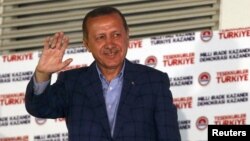With the election of Recep Tayyip Erdogan as Turkey's president, speculation is growing over the future of key economic ministers and the head of the central bank. Though they are facing growing criticism within the ruling the AK Party, their presence is seen as key to the country's economic stability.
During Erdogan's tenure as prime minister, the Turkish economy more than doubled in size.
But the markets have responded cautiously to his presidential election victory this past weekend.
According to economist Deniz Cicek of the Istanbul-based Finansbank, the markets are concerned about who will succeed Erdogan as prime minister and leader of the ruling AK Party.
"I think the uncertainty regarding the leadership of AKP might have some consequences for the markets. Currently, it's creating an uncertainty," said Cicek. "There is much pressure from the government on the central bank, and who will replace Erdogan will determine whether this pressure will ease or continue."
The governor of Turkey's central bank, Erdem Basci, has been under strong political pressure from Erdogan and key ministers, who have attacked him for not reducing interest rates fast enough.
Observers say Basci is being protected by Economics Minister Ali Babacan, who is widely seen as the architect behind Turkey's boom. But Babacan is also facing criticism from Erdogan supporters.
Atilla Yesilada, a consultant for Global Source Partners, an Istanbul-based research group, says Babacan is key to maintaining the confidence of international markets.
"As long Babacan and Erdem Basci are managing Turkish economic policy, we do not really care. They may be too tolerant of political intervention, but when push comes to shove, they do what needs to be done," he said. "Now the biggest fear in the markets is Babacan may not find a place in the new cabinet. And a lot of people speculate, without the patronage and protection by Babacan, Basci will not survive long."
Adding to markets' concern is what analysts claim is the steady erosion of independence of the financial markets' regulators.
In 2002, in the aftermath of Turkey's worst financial crisis, tough independent regulation was introduced under the guidance of the International Monetary Fund and World Bank. That regulatory regime is widely seen as being the reason why Turkey escaped the international banking crisis of 2008.
In addition, the strong pressure Erdogan's government is putting on the central bank to bring interest rates back down - and the government's success in getting the central bank to do so - has forced investors to recognize that the central bank's monetary policy committee is only nominally independent of the government.
Analyst Yesilada says, "From the statements of Numan Kurtulmus, who may become the [new] economy czar, Erdogan is going to completely personalize economic policy by ending whatever independence is left of all the regulatory agencies, to be brought under his personal order."
Turkey's strategic economic position makes it a bridge between Asia and Europe. Its NATO membership and candidacy to join the European Union reflect its importance. But with unrest and uncertainty already costing the country millions, and its stock market losing a third of its value last year, Turkey's new president and yet-to-be appointed prime minister will face considerable financial and economic challenges.




